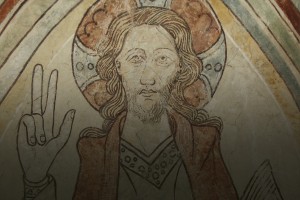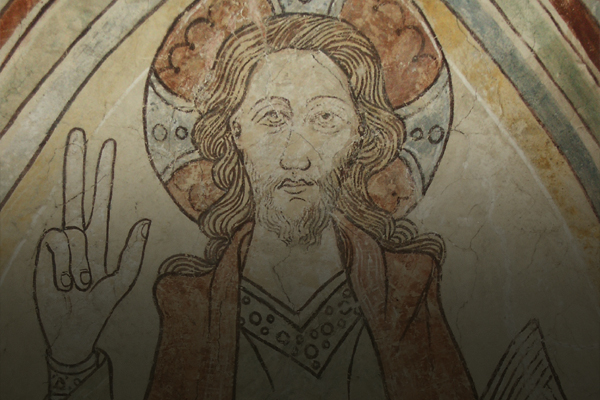
Adoptionism (2nd Century)
This heresy denies the pre-existence of Christ and therefore denies His Deity. It taught Jesus was simply a man who was tested by God and after passing the test was given supernatural powers and adopted as a son (this occurred at His baptism). Jesus was then rewarded for all He did (and for His perfect character) with His own resurrection and adoption into the Godhead.
Leader(s) in the Heresy: Theodotus of Byzantium
Corrector(s) of the Heresy: Pope Victor (190-198AD)
Docetism (2nd Century)
This heresy was coined from the Greek word, “dokesis” which means “to seem”. It taught Jesus only appeared to have a body and was not truly incarnate. Docetists viewed matter as inherently evil, and therefore rejected the idea God could actually appear in bodily form. By denying Jesus truly had a body, they also denied He suffered on the cross and rose from the dead.
Leader(s) in the Heresy: Attributed to Gnostics and promoted by the Gospel of Peter
Corrector(s) of the Heresy: Ignatius of Antioch, Irenaeus, and Hippolytus refuted it was condemned at the Council of Chalcedon in 451AD
Apollinarianism (4th Century)
This heresy denied the true and complete humanity of Jesus, because it taught He did not have a human mind, but instead had a mind that was completely Divine. The heresy lessened the human nature of Jesus in order to reconcile the manner in which Jesus could be both God and man at the same time.
Leader(s) in the Heresy: Appollinaris the Younger (bishop of Laodicea in Syria), 360AD
Corrector(s) of the Heresy: The Council of Constantinople in 381AD
Arianism (4th Century)
This heresy taught Jesus was a “creature” who was “begotten” of the Father. Only God the Father is “un-begotten”. In this view, only the Father is truly God; He was too pure and perfect to appear here on earth, so He created the Son as His first creation. The Son then created the universe. God then adopted Jesus as a son (because, after all Jesus and God are not supposed to have the same nature in this view). Jesus was worshipped only because of His preeminence as the first creation.
Leader(s) in the Heresy: Arius of Alexandria Egypt (250-336AD)
Corrector(s) of the Heresy: The Council of Nicaea in 325AD. The Nicene Creed was written to respond to this heresy.
Nestorianism (5th Century)
This heresy taught Mary only gave birth to Jesus’ human nature. The founder of the heresy, Nestorius, did not even want Mary to be called “Mother of God” but instead wanted her to be called “Mother of Christ”. In essence, the heresy maintained Jesus was really two separate persons, and only the human Jesus was in Mary’s womb. If that was true, then Jesus was not God incarnate while in the womb.
Leader(s) in the Heresy: Nestorius of Antioch (Bishop of Constantinople in 428AD)
Corrector(s) of the Heresy: The Council of Ephesus in 431AD
Eutychianism [Monophysitism] (5th Century)
This heresy taught Jesus’ humanity was absorbed by His divinity. The heresy is Monophysite in nature, derived from the Greek words “mono” (“one”) and “physis” (“nature”). In essence, the heresy claimed Jesus had only one nature (something new and different than the Divine or human nature that God and humans have, respectively). Instead, this heresy taught a third unique nature was possessed by Jesus; a blend or mixture of the human and the Divine.
Leader(s) in the Heresy: Eutyches of Constantinople (380 – 456AD)
Corrector(s) of the Heresy: The Fourth Ecumenical Council in Chalcedon in 451AD. The Chalcedonian Creed addresses this heresy.
Monothelitism (7th Century)
This heresy emerged in response to the Monophysite heresy (see above), but it also taught something denied by the Scripture. The name is derived from a Greek root that means “one will”. Monothelitism taught Jesus had two natures but only one will. Instead of having two cooperative wills (one Divine and one human), Jesus had one Divine-human “energia”.
Leader(s) in the Heresy: Patriarch Sergius I of Constantinople (610 – 638AD)
Corrector(s) of the Heresy: The Third Council of Constantinople; the Sixth Ecumenical Council (680 – 681AD) The more we understand these classic heresies related to Jesus, the better prepared we will be to spot counterfeits when they re-emerge in our culture. Share on X
These ancient heresies have been revisited by believers over the centuries and even persist into the modern era. Unitarians, for example have embraced a view of Jesus very similar to the heretics of Arianism. The more we understand these classic heresies related to Jesus, the better prepared we will be to spot counterfeits when they re-emerge in our culture.

J. Warner Wallace is a Dateline featured Cold-Case Detective, Senior Fellow at the Colson Center for Christian Worldview, Adj. Professor of Christian Apologetics at Talbot School of Theology, Biola University, author of Cold-Case Christianity, God’s Crime Scene, and Forensic Faith, and creator of the Case Makers Academy for kids.
Subscribe to J. Warner’s Daily Email
J. Warner Wallace is a Dateline featured cold-case homicide detective, popular national speaker and best-selling author. He continues to consult on cold-case investigations while serving as a Senior Fellow at the Colson Center for Christian Worldview. He is also an Adj. Professor of Christian Apologetics at Talbot School of Theology, Biola University, and a faculty member at Summit Ministries. He holds a BA in Design (from CSULB), an MA in Architecture (from UCLA), and an MA in Theological Studies (from Gateway Seminary).

































Pingback: nature | Survival SkillsSurvival Skills
Pingback: Historic Heresies Related to the Nature of Man and the Role of the Church | Cold Case Christianity
Pingback: Historic Heresies Related to the Nature of Salvation | CrossExamined.org
Pingback: J. Warner Wallace – Historic Heresies Related to the Nature of Jesus » Christian Apologetics & Intelligence Ministry
Pingback: The Daily Roundup: 17 February 2014 |
Pingback: Articles Related to Christian Orthodoxy | Cold Case Christianity
Pingback: Who Is Jesus? |
Pingback: Who Is Jesus?
Pingback: Who Is Jesus Christ? – Grace and Truth
Pingback: Corpo de Cristo - Estude o triplo significado da Bíblia
Zoran Sulc
August 31, 2021 at 4:48 pm
A form of Marcionism seems to be making inroads in the evangelical community with advocates detaching the Old Testament from the New by claiming to correct a wrong view of God whenever it depicts God as different to their view of Jesus.
Jesse
December 1, 2023 at 10:20 am
I think many of these are not heresies, they are simply humans trying to understand God and failing, and the “corrections” are also humans trying to understand God and failing.